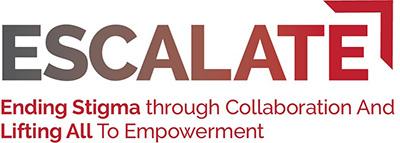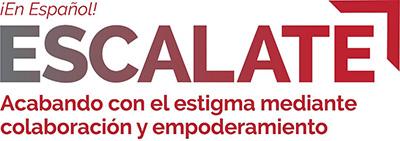The purpose of the ESCALATE training program is to facilitate transformative and relational change in Ryan White HIV/AIDS Programs (RWHAP) and the communities they serve through deepening awareness of and practices for cultural humility amongst persons with HIV and RWHAP providers, and thereby reducing HIV stigma in clinical settings.
- Create an environment of psychological safety for persons with HIV and RWHAP providers to deepen their understanding and practices of cultural humility.
- Effectively engage in difficult dialogues with communities and institutions about the influence of race, power, privilege, and identity.
- Identify stereotypes, prejudice, and discrimination as drivers of stigma while learning to recognize and manage unconscious bias, thoughts and feelings that influencing these behaviors.
- Training meets the needs of individual RWHAP care providers (e.g., clinicians, administrators, patient navigators, etc.) who acknowledge the impact of HIV-related stigma on their client populations and communities. These individuals are ready to create change but may not have the organizational capacity needed to create change across their clinical setting.
- Technical Assistance is best suited for organizations that are looking to tackle a specific concern related to HIV-stigma on a one-to-one basis (meaning, one organization working with one TA provider).
- A Learning Collaborative is an initiative in which organizations come together to study and apply quality improvement methods to a focused topic area. Organizations often work together over a 12– month period or longer, participate in Learning Sessions led by subject matter and quality improvement experts, and actively engage in Action Periods between learning sessions to implement practices and strategies. Organizations report on the results and improvements that occur during the action periods and often receive expert consultation and implementation support, thereby reducing the time required to move innovations into practice. It provides the structure to foster a collaborative environment of open communication, peer support, learning, and sharing as well as opportunities for brainstorming and problem-solving to support the implementation of evidence-based practices and strategies. Through co-learning and knowledge creation, the collaborative can address gaps in practice or the translation of evidence to practice and achieve common goals./li>
- Training applicants can apply for the training as a Stigma Reduction Team. Stigma Reduction Teams will represent a collaboration between community and organization and consist of 1 person with HIV and at least 1 RWHAP partner. A Stigma Reduction Team may have multiple RWHAP partners but must always have 1 person with HIV as a partner.
- Through Training, individuals will learn how to facilitate transformative and relational change in RWHAP and the communities they serve through deepening awareness of and practices for cultural humility amongst people with HIV and RWHAP providers and professionals.
- In creating a Stigma Reduction Team: We highly encourage organizations to select individuals who represent members of the population on which your stigma-reduction activities focus as well as people representing a wide range of roles and seniority within your organization. We also recommend that your team include staff who interact with clients, such as frontline staff, patient educators/navigators, and providers.
- Stigma Reduction Teams who complete Training should consider approaching their respective organizations to participate in future TA/LCs. Organizations that show a willingness to implement anti-stigma interventions demonstrate potential readiness for TA/LCs.
Organization-level Stigma Reduction Teams can apply to receive tailored, individualized Technical Assistance (TA) or to be part of a Learning Collaborative (LC).
- Technical Assistance (TA) is best suited for organizations that are looking to tackle a specific concern related to HIV-stigma on a one-to-one basis (meaning, one organization working with one TA provider).
- The Learning Collaborative (LC) is best suited for organizations who have all the resources and preparations in place to begin implementing a stigma-reduction program or have already begun implementing such a program.
- In creating a Stigma Reduction Team: We highly encourage organizations to select individuals who represent members of the population on which your stigma-reduction activities focus as well as people representing a wide range of roles and seniority within your organization. We also recommend that your team include staff who interact with clients, such as frontline staff, patient educators/navigators, and providers.
- Stigma Reduction Teams that have graduated from TA can apply to participate in a subsequent LC.
- Stigma Reduction Teams that are not ready to participate in TA or LCs will be encouraged to participate in Training to bolster their readiness and capacity to engage in TA and LCs in future years.
- Training is 34 hours:
- Five-day Training Program (6 hours per day; delivered virtually).
- Check-In Session One: 2 Hours.
- Check-In Session Two: 2 Hours.
- Orientation Session (60 minutes; delivered virtually).
- Pre-Work Sessions One (60-120 minutes; delivered virtually).
- On-Demand Learning (HIV-E Platform) – Population Specific Modules (60-90 minutes).
Total Hour Commitment: 40 Hours
- TA requires a monthly commitment of 5 hours per Stigma Reduction Team over the course of 9 months.
- LCs require a commitment of approximately 64 hours per Stigma Reduction Team, spread out over 14 months.
Total Hour Commitment: 40 Hours
Total Hour Commitment: 64 Hours
Your organization can send multiple individuals to Training, TA, and LCs; however, each team must be partnered with a person with HIV.
Each team can submit one application per application cycle.
Each ESCALATE training session will have a different deadline. Please visit https://targethiv.org/escalate to view upcoming application deadlines.
ESCALATE is a four-year project through August 2024. Applications for Training, TA, and LCs will be open at different intervals throughout this four year process. If you do not get accepted in to Training, TA, or LCs the first time you apply, you can apply during future program years.
Please contact the NMAC staff at the [email protected].

